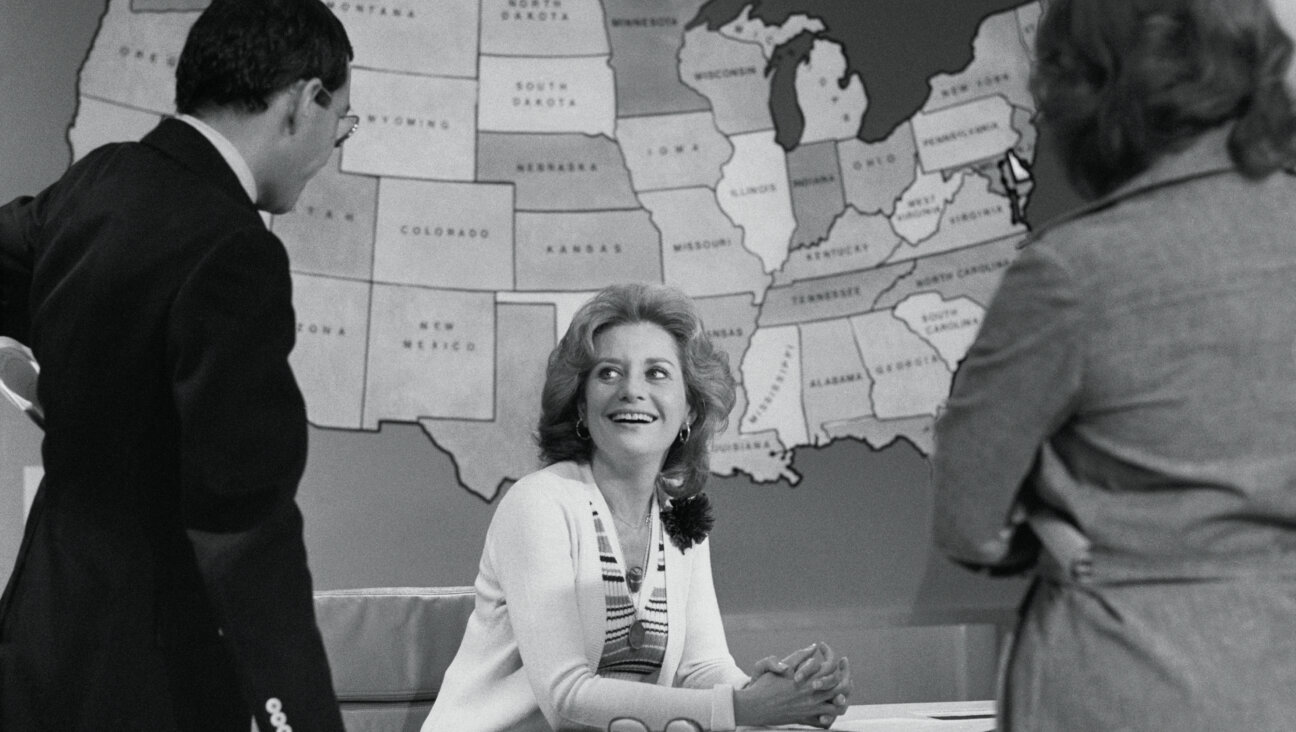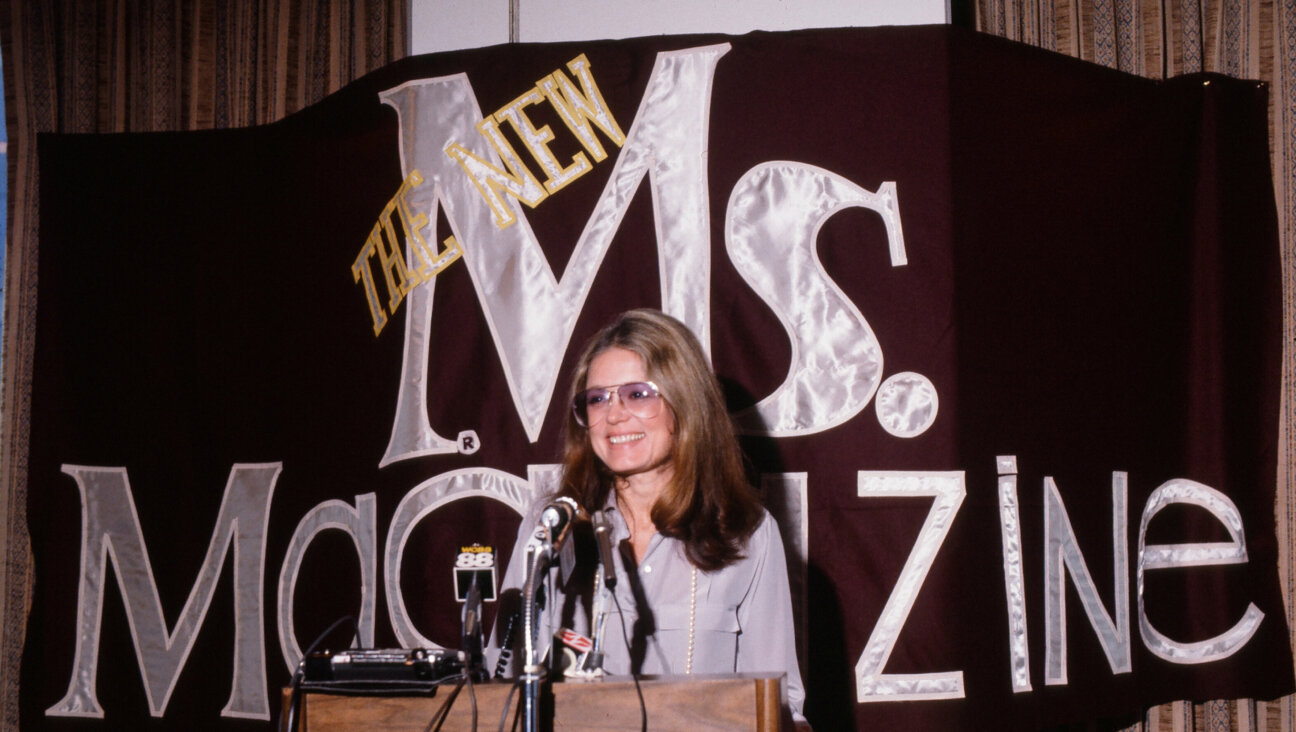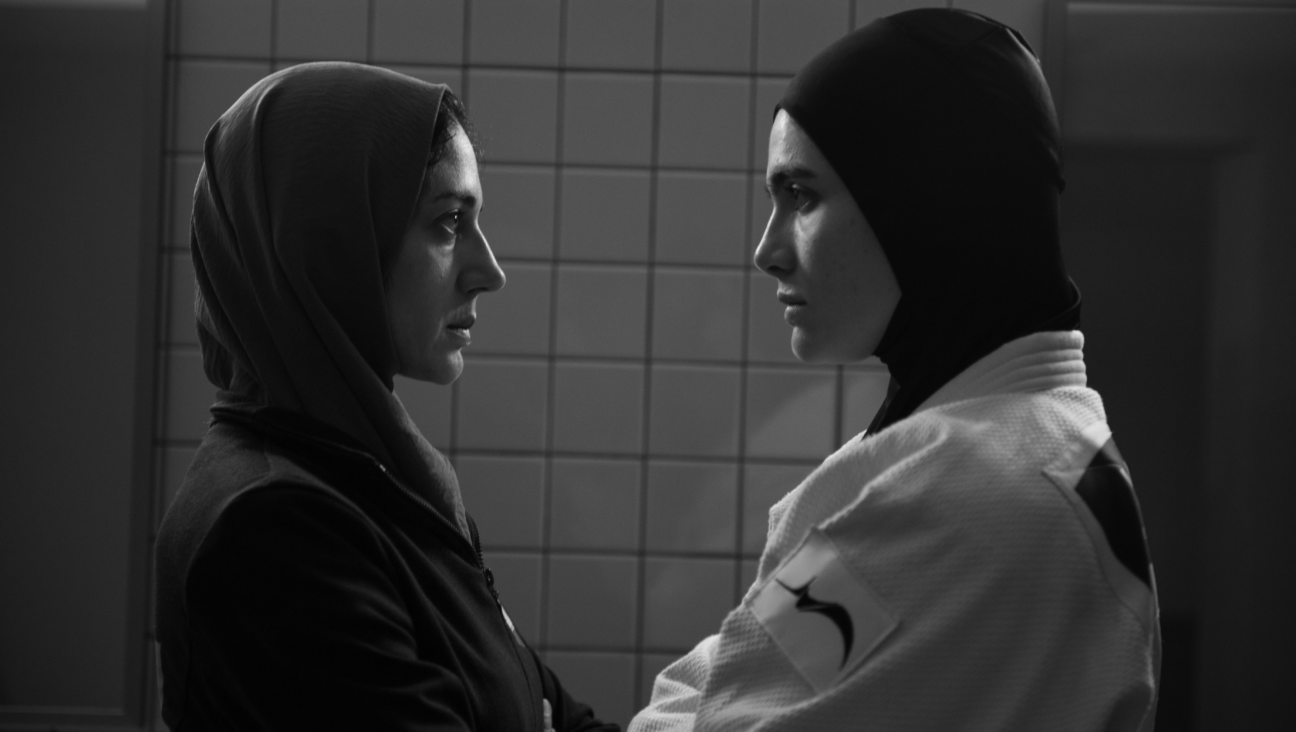Fundamentalism And Feminism Square Off In ‘The Women’s Balcony’

The Women’s Balcony Image by Menemsha Films
‘The Women’s Balcony,” the Israeli film written by Shlomit Nehama and director Emil Ben-Shimon, could easily have turned into a polemic, awash in stereotypes, about the ultra-Orthodox versus the more liberally minded in one small, closely knit Israeli Orthodox congregation.
But thanks to the talents of the actors and the creative team, the film is a deceptively simple, nuanced comedy that tackles some heady topics. Even the fundamentalist rabbi, clearly the villain here, is not without charm, whatever his flaws.
The movie recounts what happens when a synagogue balcony, where women sit segregated from the men, collapses and the whole building is deemed uninhabitable, sparking an internal feud largely split along gender lines, leading to a “Lysistrata”-like act of feminist defiance as the women leave their husbands en masse.
Contrary to what you might expect, the women in the film do not view separate seating as a sign of second-class status at all. Here, they like their balcony and want it restored in the new synagogue. The problem is money. And, far more serious, their own beloved rabbi is out of the picture, thanks to the major injury his wife sustained when the balcony gave way.
“My main challenge was to create a community that the audience would be able to love and identify with,” Ben-Shimon told me. “The film speaks about the importance of moderation, and I wanted to create the film in a moderate but precise way without losing the liveliness of the drama and comedy. Also, how do I, as a man, tell a story that is feminine or feminist at its base? Making the film deepened my understanding of the important place women have in these synagogues and communities.”
For Nehama, who grew up in a community similar to the one depicted in the film, seeing her story on screen had added personal resonance. “When I was about 12, my father became radical in his religious beliefs under the influence of a new rabbi he met,” she recalled. “My father changed a lot, both in his appearance and his behavior. I remember it scared me at the time. The film solved an old conflict I had with my parents. I’ve been secular for many years, and my parents were very angry. I think the film managed to explain to them why I did it.”
“The Women’s Balcony” is a work of fiction, and confrontations of the kind depicted are rare, especially as there are few liberally minded congregants altogether. “Confrontations take place between extremists on both sides, each demanding that people in the middle choose a side,” Nehama said. “Taking the middle road is not acceptable anymore.”
“This is particularly true in Jerusalem, which is marked by the growing strength of the ultra-Orthodox,” added Ben-Shimon, who defines himself as a secular Jew who observes the holidays. “The inspiration for the story came from the Bukharin neighborhood in Jerusalem, and I was very interested in shooting the film there, but since this neighborhood has become ultra-Orthodox there was no possibility to do a production there.”
No violence is depicted in “Balcony,” but the presence of the fundamentalist rabbi and his growing bevy of followers breeds distrust and suspicion. Changes abound, including the sporadic surfacing of a peyes-sporting silent observer who (one assumes) is a spy for the ultra-Orthodox.
Neither the creative team nor the actors appear worried about the film stoking anti-Semitism, or even about the limits of its appeal. Fractious relations within a religious setting are by no means an exclusive Jewish/Israeli phenomenon; the same for fundamentalism. More relevant, the film’s tone is so likable, it should hit emotional chords across cultura and religious lines.
Still, it clearly speaks directly to Jews, especially those who find the fundamentalist trend disturbing — or wonderful — as large numbers of nonreligious Jews return to the fold.
“The world has become quick and crazy, and people are searching for significance,” said Aviv Alush who plays Rabbi David, a beguiling ultra-Orthodox seminarian. Alush is a life-long observant Jew whose religious beliefs have only deepened. “For the past two years I keep Shabbat and go to synagogue,” he said. “My children love to go with me. It makes me very happy to reconnect with my roots and essence. I always say Shabbat is a gift to body and soul and you need to take advantage of it to recharge yourself. I have a few friends who have tried this and they thank me.”
Alush had no trouble connecting to Rabbi David, especially when he donned the long coat and broad-brimmed hat.
“The challenge for me was to justify his actions, to present a man who believes he has received a message from God and goes forward to mend the community,” he said.
Asked how he feels about the women’s balcony, he equivocates, saying he understands the controversy but at the same time finds something beautiful in the idea that women are not obliged to pray like men. “They say in the Bible that women’s thoughts are light, but it could also mean that women’s thoughts are more intuitive, so women are above men in that sense, and that is why they are situated above men in the synagogue — on a balcony.”
None of the artists I spoke with had ever attended an Israeli synagogue where men and women sit together; gender separation is so commonplace that few gave it any thought one way or the other. Even the formerly observant were ambivalent on the topic of the balcony.
“I’m 50/50,” said Evelin Hagoel, an actress in the film. Her character, Ettie, starts a fundraising campaign for the balcony. “There’s something nice about the idea that I’m in my place and men are in their place. I find something holy in that. But I also like the idea that everyone is equal.”
Hagoel is no longer synagogue affiliated but believes in God. “If you don’t believe in God, how can you understand birth or death or belong anywhere?” she asked. “If I didn’t believe there was a power bigger than myself I’d go crazy.”
Hagoel says she felt totally in sync with Ettie’s commitment to her synagogue and loved the fact that many in the religious community praised her character: “They saw me as a good Jewish girl who fights for her place in the synagogue, who wants to be part of it.”
When the film opened in Israel last November, it was a surprise hit, garnering five nominations from the Israeli Film Academy, an Oscar equivalent. For the most part public response was positive, even among the Orthodox. Some religious women acknowledged the lack of equality between men and women in their synagogues; yet viewing the balcony through a lens of discrimination was new for them. On the flip side, one theatergoer said the women’s clothes on screen were immodest and that they evoked promiscuity. Others were troubled with Rabbi David: Some felt he was white-washed while others thought he was too villainous.
“But largely the film brought up many discussions on religious extremism in the country and the forgotten traditional moderation that used to be a common practice,” Ben Shimon said. “I want audiences to come out of the film with the hope that there is still a chance for moderate voices and that we can stand together firmly against extremist powers.
“But first and foremost I want the audiences to feel they got a satisfactory return for their time and money. I want them to be entertained. It’s not a simple task to get audiences out of their comfortable sofas to go to the cinema when you are not a big budget Hollywood film.”
Simi Horwitz was a 2016 Deadline Club finalist for a series of articles she wrote for the Forward about Orthodox women in the arts.























